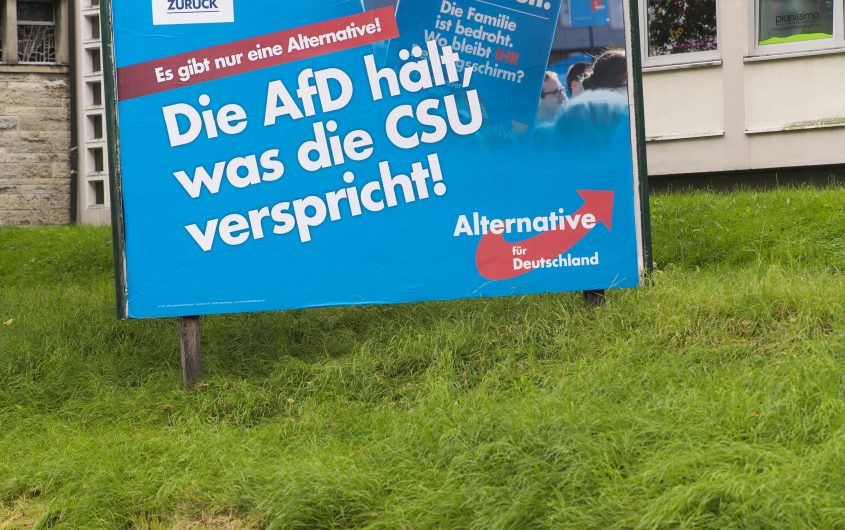
Markus Spiske via Flickr
Is the Firewall Still Standing?

Luisa Latella
Halle Foundation/AGI Intern
Luisa Latella is a research intern at AGI for the fall of 2023. She assists resident fellows with their research projects, manages databases, and helps organize and document events. Ms. Latella is an exchange student at American University as part of her bachelor’s degree in Political Science with a minor in Law at Ludwig-Maximilian-University in Munich. In her studies, she focuses particularly on international relations and the impact of power shifts in the international system on transatlantic relationships. At LMU, she works as a student assistant at the Chair of Global Governance and Public Policy researching international organizations and transatlantic relations.
No cooperation with the Alternative for Germany (AfD)—that has been the basic principle of all German parties since the AfD came on the scene after 2013. In fact, less than three months ago, Christian Democratic Union leader Friedrich Merz said in an interview: “We have a clear position in the CDU. We don’t work with the AfD. Not in the parliaments, not in the local councils.” But now a recent motion by the CDU in the east German state of Thuringia was made possible with votes from the AfD. The question arises, is the CDU’s “firewall” (Brandmauer) against the radical right-wing AfD still standing? And where and when would cooperation begin?
What happened in Thuringia?
For the first time, the opposition in Thuringia has pushed through a tax cut against the will of the red-red-green government. A CDU bill for a lower real estate transfer tax (Grunderwerbsteuer) received a majority in the state parliament resulting in homeowners and real estate buyers only having to pay 5.0 instead of 6.5 percent tax. The motion, decided 46 to 42 votes, caused a stir, not because the loss of revenue is forecast to be 48 million euros a year, but because in addition to the Free Democrats, the AfD contributed the decisive votes supporting the CDU’s legislation. While Thuringia’s CDU parliamentary group chairman Mario Voigt said the aim was to provide financial relief for families and boost the struggling construction industry, regardless of who agreed to such a proposal, the decision caused criticism from the governing federal coalition of the Left, Social Democrats, and Greens.
What is the CDU’s position?
“There’s a firewall, there’s a clear separation,” Friedrich Merz said two years ago, talking about the position of his party in regards to the AfD. More recently the CDU party leader did plead for a more pragmatic approach to elected AfD representatives on a municipal level, but after receiving criticism from his own party, he publicly revised his statements. The so-called firewall is implemented by the “incompatibility resolution.” This principle of the CDU was adopted at a party congress in 2018 and states that “the CDU of Germany rejects coalitions and similar forms of cooperation with both the Left Party and the Alternative for Germany.” This resolution is binding for all party members and is intended to provide a basis for action at every political level. But what exactly does “cooperation” mean? This is a question that many members of the CDU are asking themselves—and are finding different answers to.
“I don’t form majorities with extremists,” says Daniel Günther, CDU Minister-President of Schleswig-Holstein, representing the view that any collaboration with the AfD also constitutes cooperation. But not all members of his party share his opinion. Henrik Gotsch, CDU politician in Stralsund’s city parliament in Mecklenburg-West Pomerania, sees no problem or cooperation in agreeing to motions, even if these are presented by the AfD. He states that only actively working together can be defined as cooperation. In his opinion, “that has nothing to do with the fact that one agrees content-wise to a request.” Friedrich Merz has now adopted a similar attitude, contrary to his earlier statements. He defended the actions of the Thuringian CDU parliamentary group before the vote, saying that the CDU will not change the topics important to them, just because there might be approval from the wrong parliamentary group. “There will be no cooperation with the AfD at the federal or state level,” he added. “That is not going to change.”
Even if some voices plead that cooperation is partly necessary in order to be able to act in the interest of the citizens, there is only one real winner from incidents like the one in Thuringia: the AfD.
The ambiguous position of the CDU is also increasingly criticized by other parties. “Mr. Merz has blinked in all directions in recent months on the subject of the AfD. There is no common position on how to deal with the AfD within the CDU, and that’s a problem,” says Kevin Kühnert, General Secretary of the SPD. Exactly this issue is also addressed by CDU Member of the Bundestag Marco Wanderwitz from Saxony, who demands clarification from the party leadership and a new resolution—this time with less room for various interpretations. In his opinion, this is the only way to prevent the normalization of the radical right-wing AfD and to ensure a unified approach within the CDU again. Whether the incident in Thuringia can be seen as cooperation with the AfD divides opinions within the party—experts, however, have a clear position on this: “Yes, joint voting is already a cooperation, because you think it is a good proposal,” says Prof. Martin Gross, political scientist at the Ludwig-Maximilians University Munich.
Is Thuringia an exception?
Even though the uproar after the vote in Thuringia was great, this is not the first case of cooperation between the CDU and the AfD. Even other parties, such as the SPD or the Left Party, have already cooperated with the right-wing party—especially at the municipal level, the guidelines from Berlin are often ignored. The reason for this is whenever the AfD submits pragmatic and citizen-oriented motions, the other parties are often unable to object. Uwe Schlammer from the Left Party believes that cooperation with the AfD cannot be generally banned, since it is unrealistic to make decisions at the municipal level while ignoring the representatives of the AfD. “You can’t just say: watch out, you’re an AfD member, what you’re saying is nonsense,” Schlammer said. For example, if the AfD wants to close a pothole in a street: “The other parties can’t just stand up at the municipal level and say: No, the pothole will remain open.”
In Saxony, substantive AfD motions have obtained a majority at the municipal level in four cases, three times with CDU votes, including a case in Bautzen. There, the CDU voted almost unanimously in favor of an AfD motion in the district council last December. The motion was about cuts in benefits for asylum seekers. The AfD has a strong presence in the district, regularly participating in demonstrations and displaying right wing extremist symbols. The fact that an AfD motion could only get a majority with the help of the CDU angered many in town.
What makes Thuringia special is the fact that cooperation is taking place at the state level. Additionally, the CDU parliamentary group was already aware of the AfD’s support in advance. Kevin Kühnert states: “The AfD had announced beforehand that it would agree. No one should put themselves in a voting situation where they know that it can only come to a majority with the AfD.” Furthermore, this creates an opportunity for the right-wing party and the possibility to influence the state budget. In addition, the Thuringian AfD has been officially classified as right-wing extremist by the Office for the Protection of the Constitution (Bundesverfassungsschutz). Joint decisions with such a party are another dangerous step away from unconscious support to conscious cooperation. “If the federal organization of the CDU says that they don’t cooperate with the AfD, then it’s these small cases that tear the crack in this firewall,” says political scientist Gross. “Basically, the firewall no longer exists on a municipal level, and it no longer exists in the state parliament now.”
What is the problem with cooperating with the AfD?
Incidents like the one in Thuringia give AfD more power, signaling to voters the effectiveness of their vote and allowing the party to co-govern. That is why it is so important to refrain from cooperating with the AfD, especially for conservative parties like the CDU. “I’m afraid that this will reinforce the impression for people: the AfD is not so bad after all, because even the CDU agrees with their proposals,” says CDU party member Anke Knaak. So far, there have been no consequences for the for the Thuringian CDU’s deviation from the national party’s principles—quite in contrast to other parties. In Hildburghausen, two SPD town councilors supported a deselection process against the incumbent mayor together with AfD party members and are now facing an investigation, which, in the worst case, could lead to expulsion from the SPD.
If the established democratic parties cooperate with an openly radical right-wing party, it leads to the normalization of its anti-democratic and problematic content. It transforms the AfD from an opponent to a partner and thus places it on one level with the other democratic parties, despite the problematic issues which they stand for, signaling the public a toleration, if not support, of these. The AfD is a party whose members are known for their right-wing populist and contemptuous statements—especially high-ranking members. Prominent figures such as Björn Höcke, regional chairman of the AfD in Thuringia, repeatedly makes headlines about his fascist and Nazi views. He had drawn attention in the past for statements such as calling the Holocaust memorial in Berlin a “monument of shame” and is currently facing a trial for the use of a forbidden Nazi phrase during a speech on a party rally.
Even if some voices plead that cooperation is partly necessary in order to be able to act in the interest of the citizens, there is only one real winner from incidents like the one in Thuringia: the AfD. Federal chairwoman Alice Weidel wrote on X: “Merz’s firewall is history—and Thuringia is just the beginning,” clearly showing how the AfD is aware of its own potential to divide the established parties. The AfD is gaining votes and political power across Germany, currently receiving its best poll ratings since its founding a decade ago. With 22 percent, the AfD is at the moment the second-strongest party in polls, behind the CDU. Considering this development, it is even more important for the other parties to have a unified position toward the AfD. In the east in particular, the AfD’s influence can only be effectively contained if all the other parties cooperate. “It is and remains wrong to use the AfD to push through political majorities. It needs nevertheless rather the compromise among the democrats, also to reach undoubtedly correct goals.,” says former Saarland Minister-President Tobias Hans of the CDU. It is the only way to repair the cracks in the firewall before it collapses—further paving the way for AfD gains.








